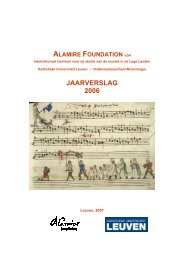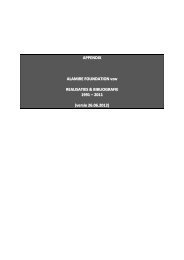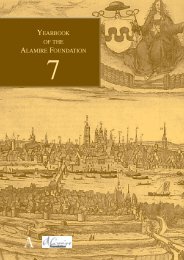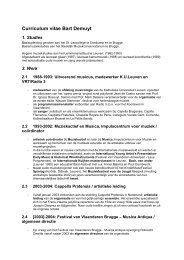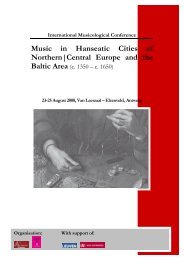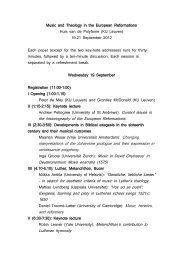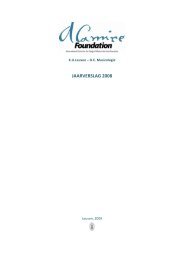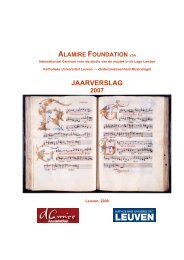YEARBOOK OF THE ALAMIRE FOUNDATION
YEARBOOK OF THE ALAMIRE FOUNDATION
YEARBOOK OF THE ALAMIRE FOUNDATION
You also want an ePaper? Increase the reach of your titles
YUMPU automatically turns print PDFs into web optimized ePapers that Google loves.
WHO OWNED LASSO’S CHANSONS?<br />
own and which displays the personal imprint that makes it a specific, vital, and significant<br />
act of communication.” 2 At the very least the results of substituting new words<br />
for old in the context of a musical work challenges many basic assumptions about<br />
the aesthetic unity of a work of art and about what we presume to be the authorial<br />
intentions it embodies. At worst, the contrafacta volumes appear to have been prepared<br />
using a pious version of what we might now regard as a morally bankrupt business<br />
model: justify theft according to the utility of the result. The Huguenot editors<br />
of these books would claim for their edited versions of Lasso’s chansons a meaning<br />
more authentic than that of the composer himself, inasmuch as their new texts redirect<br />
the emotional valences of his music to a higher moral purpose than did the original<br />
lyrics.<br />
One remarkable feature of the books that offer contrafacta of the Lasso chansons<br />
is the degree to which these prints acknowledge and play upon the peculiar<br />
power of Lasso’s compositional voice, his poetic choices, and even the particular<br />
printed books from which his music has been appropriated. The prefaces to Jean<br />
Pasquier’s revisions of Lasso’s chansons (issued in La Rochelle in 1575 and 1576)<br />
explicitly acknowledge the superiority of Lasso’s powers as a composer while simultaneously<br />
deploring his poetic choices: ‘Among all the musicians of our century<br />
Orlande de Lassus appears (and has good right) to deserve good standing, for the<br />
excellence and admirable sweetness of his music.’ 3 In a series of republications of<br />
Lasso’s music issued in 1576, 1582, and 1594 the Genevan preacher Simon Goulart<br />
went so far as to call upon the composer himself to reconsider his poetic choices: ‘It<br />
would be good to wish that Orlande would use his graces, which the Spirit has adorned<br />
in him above all, to recall and magnify the one from whom they derive, as he has<br />
done in several Motets and Latin Psalms. I deeply wish that these chansons provoke<br />
the urge in him.’ 4 The books by Pasquier and Goulart, in short, establish their credibility<br />
with readers not by representing themselves as identical to the ‘authentic’<br />
2 From one of Umberto Eco’s now classic essays on texts and their meanings, U. ECO, The Poetics of<br />
the Open Work, in The Role of the Reader: Explorations in the Semiotics of Texts, Bloomington, Indiana,<br />
1979, p. 63. For a recent collection of essays (by Eco, Jonathan Culler, and Richard Rorty, among<br />
others) situating Eco’s thought in the context of Continental and Anglo-American critical thought, see<br />
U. ECO, Interpretation and Overinterpretation, ed. S. COLLINI, Cambridge, 1992.<br />
3 From the dedication to Jean Pasquier’s Mellange d’Orlande de Lassus contenant plusiers chansons, à<br />
quatre parties desquelles la lettre profane à este changée en spirituelle, La Rochelle, 1575 (addressed<br />
to Catherine de Parthenay, the Duchesse de Rohan): Et pource qu’entre tous les Musiciens de notre<br />
siecle Orlande de lassus semble (et a bon droit) devoir tenir quelque bon lieu, pour l’exellence et<br />
admirable douceur de sa Musique.<br />
4 From the preface to Simon Goulart, Thrésor de musique d’Orlande contenant ses chansons à quatre,<br />
cinq et six parties, [Geneva], 1576: Il seroit bien à desirer qu’Orlande emploiast ces graces dont le S.<br />
Esprit l’a orné par dessus tous, à reconoistre et magnifier celui de qui il les tient, comme il l’a fait en<br />
quelques Motets et Pseaumes Latins: et je desire grandement que ces chansons lui en puissent donner<br />
la volonte: à fin que nous aions une chaste Musique Françoise. The same comments reappear in the<br />
1582 and 1594 editions of Le Thrésor de musique d’Orlande.<br />
161



